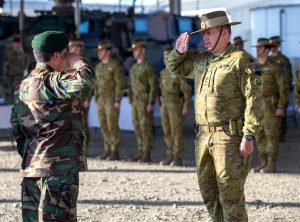The Australian government welcomed the announcement of a planned withdrawal of U.S. forces from Afghanistan and called on the Taliban to negotiate “with the Afghan government in good faith.”
Australian Foreign Minister Marise Payne and Defense Minister Linda Reynolds issued a joint statement earlier this week welcoming the agreement reached between the United States and the Taliban, which will see all American troops leave the war-ravaged country within 14 months.
“Australia supports agreements and processes that aim to bring peace to Afghanistan after decades of conflict,” the statement said. “We call on the Taliban to continue to reduce violence and enter into negotiations with the Afghan government in good faith.”
“Terrorism will continue to present a threat to Afghanistan. The security and stability of Afghanistan will be vital in containing the threat of international terrorism, as well as addressing people and narcotics smuggling.”
Around 400 Australian troops remain in the country. More than 26,000 Australian personnel have served in Afghanistan since the war began in October 2001.
Forty-one Australian soldiers have been killed, along with more than 150,000 Afghans, including around 50,000 civilians. More than 2,500 American troops have been killed in Afghanistan.
Under the agreement, the Taliban will cut ties with al-Qaeda and other terror groups and eventually enter peace talks with the Afghan government — whom they have long viewed as a puppet of the United States.
In return, the United States will begin the withdrawal of 3,400 troops and the closure of five military bases as of March 10, with the remaining 8,600 troops to be out within the next 14 months.
U.S. Defense Secretary Mark T. Esper announced the agreement on Monday, telling reporters: “We are going to show good faith and begin withdrawing our troops.”
Around the same time, though, the Taliban declared renewed attacks on Afghan forces, quickly dashing hopes of a prolonged ceasefire amid further negotiations.
Australia’s Home Affairs Minister Peter Dutton confirmed to the ABC that Australian troops would be withdrawing alongside the coalition.
“If there’s a withdrawal of coalition troops, we’ll do that in line with consultations with the United States, the UK and our 5-Eyes partners,” he said.
When questioned whether Australia’s involvement and the loss of lives was worth it now knowing that the Taliban can return to power, Dutton said that “there are many facets to our involvement in the conflict.”
“For us there are important equities in the Middle East,” he said. “We have done an enormous amount in terms of intelligence-collection in Afghanistan, in Iraq, elsewhere across Syria, for example, and the collection of that intelligence has stopped terrorist attacks taking place in the West including in Australia.”
Most Australians will be happy to see an end to their country’s involvement in the war. Just last week the inspector-general of the Australian Defense Force, James Gaynor, tabled a report in parliament that claims the military watchdog is investigating at least 55 separate allegations of unlawful conduct in Afghanistan by Australian soldiers.
Australian troops, alongside other coalition forces, are likely to continue to focus on training Afghan troops during negotiations between Afghan officials and the Taliban, which are scheduled to begin on March 10.
The talks are already in jeopardy though, as Afghan President Ashraf Ghani has refused to release 5,000 Taliban prisoners, despite the deal the U.S. and the Taliban signed stating that negotiations will not commence until they have been released. The Kabul government was not party to the agreement.
“The Government of Afghanistan has made no commitment to free 5,000 Taliban prisoners,” Ghani told reporters a day after the deal was signed. “It is not in the authority of the United States to decide, they are only a facilitator.”
In response, a Taliban spokesman told the New York Times that “the release of prisoners before the start of the intra-Afghan negotiations is a must.” He suggested that if the Taliban prisoners are not released, the negotiations won’t start as scheduled on March 10.
































